Teaching Traveling: Welcome, Maureen Klovers! Readers, get ready for a remarkable story unlike any you’ve heard before.
Maureen, tell us about your background.
Maureen: I have a checkered past! Originally from Milwaukee, I started my career as a U.S. intelligence agent focused on Latin America and moonlighted as an English as a Second Language (ESL) teacher and a panelist on a local radio station’s Sunday morning talk show.
Following a discussion with one of my ESL students— in which he casually remarked that he came to the U.S. packed into a gas tank with other illegal immigrants, several of whom suffocated— I quit my job, gave up my rent-controlled apartment, and moved into a convent in Quito, Ecuador, to teach in a Jesuit school for shantytown dwellers and attempt to understand why so many people are so desperate to come to the United States.
This experience was so profound that I actually wrote a book about it. Entitled “In the Shadow of the Volcano: One Ex-Intelligence Official’s Journey through Slums, Prisons, and Leper Colonies to the Heart of Latin America,” it chronicles my year fending off marriage proposals from thirteen-year-old Darwin, tussling with his tormented classmate Oscar, and struggling to decode the intricacies of the junior high pecking order.
In the book , I also describe slums and leper colonies that I visit, interview inmates at the Quito Women’s Prison, and examine how the lives of Quito’s ordinary citizens are affected by a crony capitalism that concentrates wealth and power in the hands of a few.
After returning from Ecuador, I went to graduate school and began a career in economic development. I’m working on a mystery novel now and—of course!—squeezing in as much travel as possible, including trips to China, India, Eastern Europe, and Turkey!
TT: What a fascinating background! Tell us more about your travels.
M: A few years ago, I traveled to China for three weeks. My first stop was Beijing, where my friend’s friend’s husband (let’s call him “Ming”), a powerful Chinese businessman “had arranged everything.”
Three teenage boys were waiting for me at the airport with a home-made sign bearing my name, and they escorted me into a van (I’m so trusting!) and whisked me away to a nice hotel, where “Ming” had made me a reservation at the Chinese (not Western) price.
The boys insisted on escorting me to my room, where they told me that my “guide” would be calling me in five minutes. In exactly five minutes, the phone in the bathroom mysteriously rang and a woman told me in excellent English that she would be picking me up at 9 a.m. the next morning for our tour.
The tour (which I had no idea “Ming” had booked) turned out to be wonderful, but the oddest thing was that neither the boys nor my guide had ever met Ming, nor had anyone they knew. But they were all anxious that I should provide “Ming” with a good report. I felt as though I were on a tour organized by Keyser Soze!
In Shanghai, I met up with an old high school friend and then attended a week of seminars organized by my MBA program, including a very interesting session with the American cowboy boot-wearing CEO of Wal-Mart in China.
At the end of the week, I bought a plane ticket from the travel agency at my hotel to fly to Tunxi, from where I planned to hike the sacred mountain of Huang Shan. The day of the flight, I took a taxi to the airport, retrieved my boarding pass, and went through security.
I was just handing my boarding pass to the gate agent when I saw ‘Chongqing’ written in English. I pointed at my boarding pass and repeated ‘Tunxi’ over and over again, but the gate agent sadly shook her head. Apparently I had been duped by the travel agency—I had a ticket, written only in Chinese, to Chongqing!
I made a split-second decision not to board the plane and decided, as Plan B, to go to the bus station, buy a ticket to Ningbo and then hop on a ferry to an island full of Buddhist shrines. When I got to Ningbo, however, the ferry was not running so I spent the afternoon trying to communicate in the most rudimentary Chinese with teenage girl about the fashions in “People” magazine and going to the movies, where people spent more time staring and laughing at me than the movie.
When I finally arrived on the Buddhist island, it was splendid—peaceful and beautiful in contrast to frenetic Shanghai and Beijing. One night I tried to find a seafood restaurant listed in my “Lonely Planet” guide. Since my Chinese was positively unintelligible, I tried accosting locals and pointing to the characters in my guide book. Most people shrugged and laughed or looked confused.
No one seemed to be familiar with the restaurant. Finally, I found the town playboy, who was more than happy to escort me to the restaurant—except it turned out not to be a restaurant at all, but a guy’s garage filled with plastic dish tubs of live fish! I pointed at the fish I wanted, and the owner scooped it up and put it in a Ziplock bag, as though I were going to take it home with me.
I flipped through my dictionary until I found the word for ‘cook’ and pointed at it. He took me inside, where his wife cooked the fish in a delicious brown sauce with rice, and the playboy followed me. While I ate, he flipped through my phrasebook, pointing at phrases such as “Can I come to your hotel room?” and “Are you married?”
I pointed to phrases such as “My husband is a big hairy wrestler.” After a half an hour or so, the owner’s son came in, began arguing heatedly with the playboy, and finally—just as it looked as though they were going to come to blows—threw him out of the house. And I still have no idea what they were arguing about, which just reinforces the point that not speaking the language is a real disadvantage!
TT: What stories you have!!! How do you find your travel opportunities?
M: I spent a week in China with my MBA program and arranged the other two weeks as independent travel.
I found out about the volunteer opportunity in Ecuador by writing to Catholic Charities and asking for a catalog of their overseas volunteer opportunities.
TT: How did you find the money to fund this travel?
M: To travel through China, I funded the trip entirely myself.
For my teaching job in Ecuador, I received a $150/month stipend from the Milwaukee Catholic Archdiocese. Room and board was provided by the school at which I taught.
TT: Tell us one moment from your travels that was particularly powerful, interesting, or funny.
In La Paz, Bolivia, I toured the local prison. My guide was a German narco-trafficker named Hans who had figured out that he could make a fortune by charging morbidly curious backpackers ten dollars for a tour. Hans had piercing blue eyes and sunburned, leathery skin, and when an Australian woman asked him what he was going to do when he was released, he told us that he would go right back to narco-trafficking.
“I’ve done a lot of recruiting during my time here,” he explained in his odd guttural, clipped accent. “The next time around I’ll be leading the operation, instead of being the stooge who gets caught.”
Hans was a fountain of information. We learned that there was an average of a murder a month, that the guards could be bribed for just about anything, and that a kilo of cocaine was actually cheaper in the prison than it was on the street.
Prisoners paid one boliviano (about thirteen cents) per day for lodging, and work was not an option, but a necessity: if you didn’t work, you didn’t earn money, and if you didn’t earn money, you couldn’t buy food. I was shocked to learn that whole families lived in the prison.
“Ja, you can bring your wife to live with you if you pay one boliviano a day,” Hans said. “And if you don’t have one, they bring a busload of women from the women’s prison every fifteen days.”
“What if the women get pregnant?” the British woman next to me asked.
“Then they have a baby, and the baby lives with the mother at the women’s prison. But if it’s a boy, only until he’s six. Then the child has to come live with his father here. Right now”— he pointed at a group of men across the courtyard, who were busy building a wall of cinderblock— “some of the prisoners are building a kindergarten.”
But Hans saved his most interesting bit of trivia for the end of the tour, when we passed a soccer game in progress. Hans pointed at a large Coca-Cola billboard on the side of the canteen and explained that the company was the official sponsor of the prison soccer team. “That’s pretty much the only rule in this place,” he said without a trace of irony. “No Pepsi.”
TT: Oh my gosh!!! What a story, and what a great writer you are! How have your travels impacted you as a teacher, and in your current career?
M: Traveling has made me much more focused on issues involving access to education, income inequality, and corruption. One of the major themes of my book is how ordinary citizens can be affected by a crony capitalism that concentrates wealth and power in the hands of a few— and how important it is for us to stay ever-vigilant regarding the rights and privileges, as well as obligations, or living in a (mostly) functioning democracy.
On a lighter note, I have found that my presentation skills have definitely improved. If you can keep the attention of fidgety sixth-grade boys, you can keep the attention of restless bureaucrats too!
TT: Amen! How have your travels impacted you as a person?
M: I am much more aware of how our cultural backgrounds affect our view of the world. This isn’t just limited to what country we are from, but it also includes different regions of the country, our religious upbringing, our family/home environment, etc.
I take our high standard of living and personal and political freedoms less for granted. Finally, I appreciate how many rights and opportunities I have as an American woman. In many parts of the world, most women have very few professional opportunities, and the authorities in many countries do not take violence against women seriously.
TT: So true. What advice do you have for other teachers who are dreaming of travel, or travelers dreaming of teaching?
M: Consider the overall “package” that the experience will offer. Will you have an adequate support system? (This is especially important in a developing country, where you may experience acute culture shock and face other challenges, including physical safety and health concerns.) Will you have the opportunity to grow as a person? Will you be able to acquire new language skills, or hone ones you already have? How easily will it be to travel? (Opportunities in large cities with extensive transportation networks will facilitate travel much more easily that isolated rural posts.)
What level will your students be at, and is this a level that you will be satisfied teaching? (If you don’t want to deal with discipline issues or hormones, don’t teach pre-teens or teens!) Will you be physically safe? (I’m sad to say this, but this is a real concern in many areas of the world, especially for women.
Talk to other past female volunteers to gauge the situation and consult the U.S. State Department’s website for current conditions in the country. Also consider taking a self-defense class. Unfortunately, I knew several women who were raped during my stay in Ecuador.) How much experience do you have teaching and, if you are inexperienced, will you receive support from more experienced teachers? How well will you be able to stay in touch with friends and family from home? Can they visit, and/or is there access to e-mail?
TT: Maureen, thanks so much for this powerful, fascinating interview! Readers, what questions or comments do you have for this amazing woman?
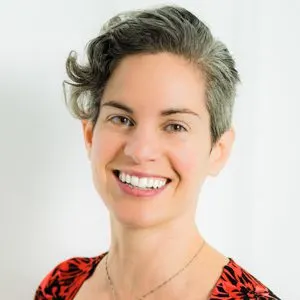
The author, Lillie Marshall, is a 6-foot-tall National Board Certified Teacher of English from Boston who has been a public school educator since 2003. She launched TeachingTraveling.com in 2010 to share expert global education resources, and over 1.6 million readers have visited over the past decade. Lillie also runs AroundTheWorld L.com Travel and Life Blog, and DrawingsOf.com for educational art. Do stay in touch via subscribing to her monthly newsletter, and following @WorldLillie on social media!

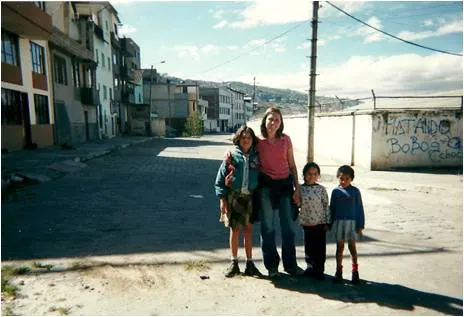
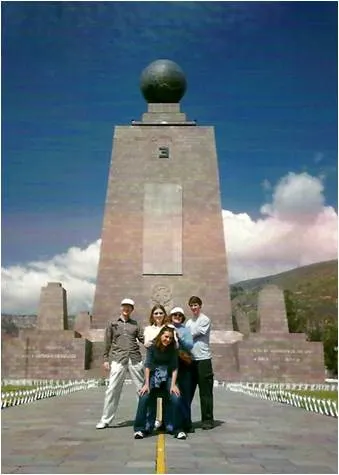

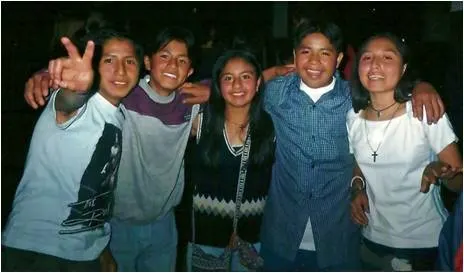
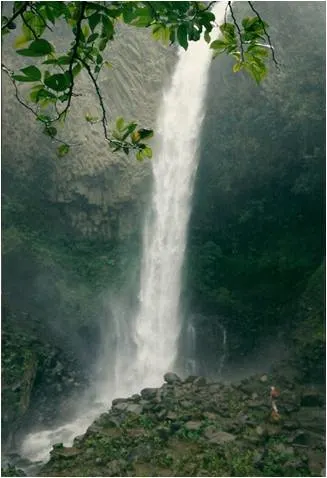
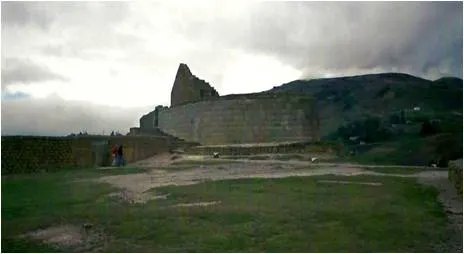
donna morang
Monday 13th of January 2014
You are incredible; funny, creative, and maybe a little crazy. I loved what you have done, and what you are still doing.